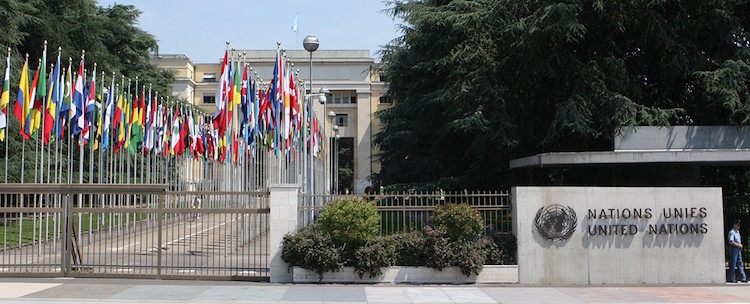By Jamshed Baruah

GENEVA (IDN-INPS) – The final session of the UN nuclear disarmament working group (OEWG) opened in Geneva on August 5, as nuclear abolition campaigners around the world were gearing up for Hiroshima and Nagasaki Day actions.
Governments will meet from August 16 to19 to discuss the OEWG draft report, with the aim to adopt the final report on August 19 for submission to the UN General Assembly. They will follow up on the substantive work it undertook in February and May 2016.
The focus in February and May was on the legal measures required to achieve a nuclear-weapon-free world, and to prepare recommendations on reducing nuclear risks, enhancing transparency, and building further awareness about the humanitarian impact of nuclear weapons.
A number of non-nuclear States have called for multilateral negotiations in 2017 on a legal agreement to ban nuclear weapons. However, other States have expressed doubts about the value of such negotiations if there is no participation of nuclear-armed States or those under extended nuclear deterrence relationships. Todate, none of the nuclear-armed or allied States support such negotiations, and there is no obligation for them to join.
On August 5 the Basel Peace Office, an UNFOLD ZERO partner, introduced a working paper, which expanded on a novel proposal in the OEWG draft report. The proposal calls for a nuclear-ban amendment conference of the Non-Proliferation Treaty.
If one-third of the States Parties to the NPT call for such a conference, the NPT depositories (Russia, the United Kingdom and the United States) are legally obliged to hold the conference, invite all States Parties to the NPT to attend and discuss the proposed nuclear weapons ban.
Such an NPT conference could therefore build political momentum and legal impact for a nuclear ban, particularly in nuclear-armed and allied states. It would ensure that NPT members have to consider the proposal for a ban treaty, and would therefore build support for the nuclear prohibition negotiations which are likely to be established by the United Nations.
A similar strategy was used in 1991 to establish a global ban against nuclear tests. States parties to the Partial Test Ban Treaty called for an amendment conference to turn the PTBT into a CTBT, and this was instrumental in moving the nuclear-armed States to agree to negotiate a comprehensive nuclear test ban treaty (CTBT).
BPO also called on the OEWG to recommend that nuclear-armed States adopt no-first-use policies as an interim step to a comprehensive nuclear prohibition agreement. Two of the nuclear-armed States have already adopted such policies (China and India) and President Obama is considering doing so.
President Obama has already announced in his 2010 Nuclear Posture Review a commitment to move to ‘sole purpose’ (the only purpose of nuclear weapons being to deter other nuclear weapons) which is close to a no-first-use policy.
Both options have been resisted by pro-nuclear forces in the U.S. and in allies of the U.S. that are reliant on extended nuclear deterrence (Japan, South Korea and NATO countries).
The Washington Posts reports that opponents in the U.S. Congress are arguing that no-first-use would weaken the security of the ‘allies that live under the U.S. nuclear umbrella, especially in Europe and Northeast Asia.’
In one measure of support from allied countries (and others), the Parliamentary Assembly of the Organisation for Security and Cooperation in Europe (OSCE PA) adopted a declaration on July 5 this year which supports no-first-use. The assembly includes parliamentary delegations from all NATO parliaments.
On August 5, participants in the OEWG shared general views, before going into detail on text of certain parts of the draft report. These included Algeria, Argentina, Australia, Austria, the Basel Peace Office, Brazil, Canada, Chile, the Community of Latin American and Caribbean States (CELAC), Costa Rica, Ecuador, Egypt, El Salvador, Fiji, Finland, Germany on behalf of a group of ‘progressive’ states, Guatemala, ICAN, the International Fellowship for Reconciliation, Indonesia on behalf of a group of states, Iran, Ireland, Kenya, Malaysia, Mexico, Nigeria, Norway, South Africa, Sweden, Switzerland and UNFOLD ZERO.
UNFOLD ZERO, reported on the Chain reaction of civil society actions for nuclear abolition around the world, especially those for Hiroshima and Nagasaki Days.
UNFOLD ZERO presented the Hiroshima Appeal for a Total Ban on Nuclear Weapons to the OEWG, and called on the final OEWG report to recognize the contribution civil society has been making to the OEWG. [IDN-InDepthNews – 08 August 2016]
Related story: http://www.indepthnews.net/index.php/nuclear-abolition/555-astana-and-geneva-preparing-ban-the-bomb-conferences
Photo credit: UNFOLD ZERO
IDN is flagship agency of the International Press Syndicate.






